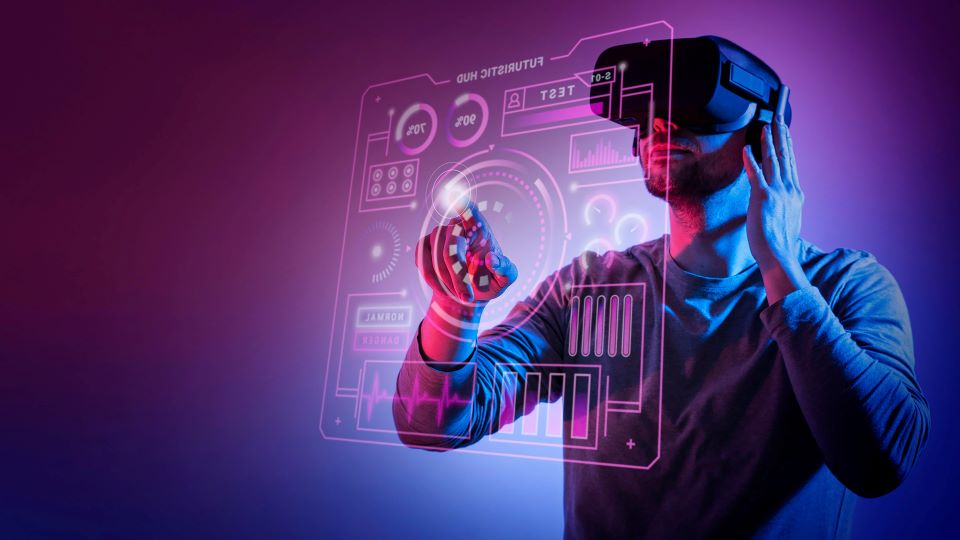The concept of virtual reality (VR), which once seemed like a far-off fantasy, is now a burgeoning reality that is rapidly altering how we interact with digital spaces. VR is poised to transform our lives and a wide range of industries because it has the ability to immerse us in entirely new worlds or enrich our surroundings with layers of data. This blog post explores the rise of VR and highlights how it has the potential to change the course of human history.
Understanding Virtual Reality
Virtual reality (VR) is fundamentally a simulated experience made possible by computer technology that creates an engaging artificial environment. Users of specialised VR headsets can interact with 3D worlds in real-time while experiencing sensory effects that are strikingly similar to — or occasionally even surpass — those of actual life.
The Exciting World of VR in Gaming and Entertainment
Gaming and entertainment are frequently the first things that come to mind when people think of VR, and for good reason. Video games have been given new life thanks to virtual reality, which allows players to enter their favourite virtual worlds. VR gaming offers an unmatched level of immersion, whether you’re fighting zombies in post-apocalyptic landscapes or exploring fantastical worlds.
However, VR has many uses that go well beyond gaming. By enabling interactive viewing experiences, the technology is poised to upend the film and television industries. With virtual reality, you could experience being an active participant in an exhilarating adventure film or touring the locations of your favourite TV show.
VR: An Innovative Tool for Education and Training
VR has enormous potential for training and education. Virtual reality (VR) can offer a hands-on learning experience by developing interactive, immersive simulations, providing a fresh way for students to interact with difficult subjects. Virtual reality (VR) can make learning genuinely captivating, from touring the Egyptian pyramids to walking with dinosaurs.
Industries like healthcare, aerospace, and the military are utilising VR to train their personnel in a secure setting for professional training. Through VR, surgeons can practise complex procedures, astronauts can train for space travel, and soldiers can manoeuvre simulated battlefields.
The Business World Reimagined: Virtual Conferencing and Product Design
Because it makes it possible to hold virtual conferences, virtual reality is revolutionising business operations. VR can support immersive, collaborative environments, bridging the physical distance between team members dispersed across the globe, as remote work continues to expand.
Additionally, the process of product design is being streamlined by VR. Utilizing virtual reality (VR), engineers and designers can efficiently and cheaply prototype, design, and refine products. Before a physical prototype is built, virtual reality (VR) gives the chance to interact with 3D product models, identifying problems and making improvements.
The Future of Virtual Tourism and Real Estate
The real estate and travel sectors are also using VR to its full potential. Virtual tours give prospective travellers or buyers the chance to tour locations, lodgings, or properties without ever leaving their homes. This not only offers a convenient way to view several locations quickly, but also saves time and resources.
VR and Mental Health: The Therapeutic Potential
Surprisingly, VR is causing a stir in the field of mental health therapy. It is employed in exposure therapy for phobias and PTSD, enabling patients to face their anxieties or traumatic memories in a secure setting while being supervised by therapists.
Embracing a Future Shaped by VR
As we approach a new era that will be shaped by VR, it is abundantly clear that the technology offers much more than just immersive gaming. VR is on track to revolutionise our daily lives and reshape how we interact with the digital world by transforming education, healthcare, business, and more.
The development of VR is evidence of human ingenuity and our never-ending quest for innovation. We can anticipate a future in which VR technology will not only be used to create amazing virtual worlds but will also be used to enhance and enrich reality. We are active participants shaping and experiencing a future that is only constrained by our imaginations as we begin this exciting journey, rather than passive observers.

